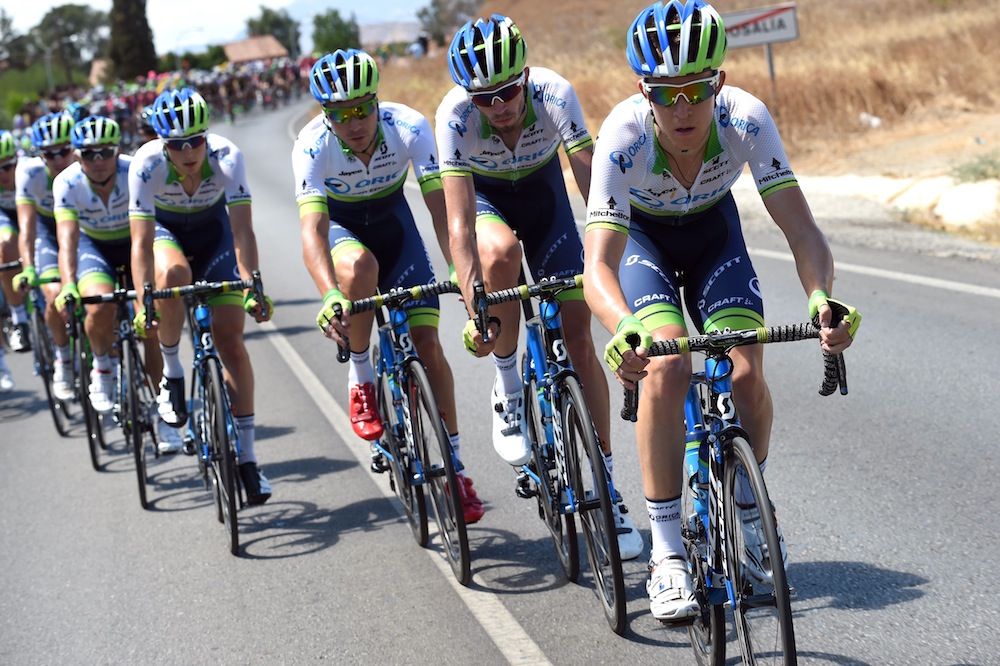MPCC exodus: The future looks bleak for the voluntary body, say team managers
After Orica-GreenEdge and Katusha left earlier this week, what exactly does the future hold for the MPCC?


Orica-Green Edge chase on stage three of the 2015 Vuelta a España (Watson)
The MPCC's future looks bleak, says Lampre-Merida team manager Brent Copeland, on the heels of Orica-GreenEdge and Katusha leaving the voluntary anti-doping organisation. Teams told Cycling Weekly this morning that they find it hard, if not impossible, to live by two sets of rules.
On Tuesday, Orica and Katusha left and brought down the number of WorldTour teams to seven in the Movement for a Credible Cycling (MPCC). The movement with its stricter anti-doping rules gained momentum with increased membership following the Lance Armstrong scandal in 2012.
"Does it have a future? No. Not with the UCI's changes, unless they do something drastic," Lampre-Merida Team Manager Copeland said.
"Two sets of rules cause conflict and confusion. One side says no, the other yes. We could not race the defending Vuelta a España champion Chris Horner."
Lampre-Merida had to pull Horner from its Vuelta start list in 2014 because a test revealed low cortisol levels. Though the UCI governing body would allow him to race, the MPCC's rules required he take a eight-day rest.
Lampre left the movement last year after another conflict. The MPCC said it could not race Diego Ulissi after his anti-doping ban, but Swiss worker laws meant that the team still had to race the contracted rider.
Katusha left the movement yesterday when it faced a racing ban over two positive anti-doping cases. The UCI ruled on the cases and even with its new beefed up rules, gave Katusha the green light to race.
The latest race content, interviews, features, reviews and expert buying guides, direct to your inbox!
"Public opinion is never good when you pull out when it goes wrong," Copeland added. "My advice is to do it the way Orica did it. Take a vote and decide."
"It's up to the MPCC to decide its future," General Manager of Orica-GreenEDGE, Shayne Bannan said.
"They played a big role. We passed many of our internal policies based on the MPCC, they triggered our thought process. They played a role in the UCI's current rules. It's not impossible [to live by two sets of rules], but the question is what is the effectiveness of it given the UCI's rule changes?"
In January 2015, the UCI rolled out several new rules similar to what the MPCC already had in place. It still does not have one for low cortisol values.
"Our decision should take nothing away from what the MPCC stands for,” Bannan explained.
“They've done a tremendous job in taking the sport forward in the last six to seven years. The biggest role they played was helping create a no needles policy. That was a game changer."
Out of the 18 WorldTour teams, only seven are members. Sky never joined. Astana, BMC Racing, Etixx-Quick Step, Katusha, Lampre, LottoNL, Movistar, Tinkoff and Trek-Segafredo are also not members.
"It's hard to get on board with the organisation because we have to follow the UCI's rules above all," Trek-Segafredo general manager, Luca Guercilena said. "That's the limiting factor. It's just not practical. Having two sets creates confusion."
Gregor Brown is an experienced cycling journalist, based in Florence, Italy. He has covered races all over the world for over a decade - following the Giro, Tour de France, and every major race since 2006. His love of cycling began with freestyle and BMX, before the 1998 Tour de France led him to a deep appreciation of the road racing season.
